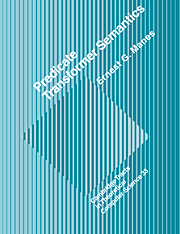Book contents
11 - Representations by Relations
Published online by Cambridge University Press: 06 January 2010
Summary
In this section we will introduce the typed formal language PBC for the Propositional logic of Boolean Categories which may be regarded as loop-free propositional dynamic logic with data types. The main result is that the set of formulas valid in all Boolean categories coincides precisely with the set of formulas true in Mfn. We give two proofs. The first works only for atomic Boolean categories, but the construction is very straightforward. The second, general proof uses ultrafilters and follows that of [Kozen 1980] for dynamic algebras.
The language PDL of [Fischer and Ladner 1979] defines programs and formulas by mutual recursion as follows (where we have made notational changes to conform to previous sections of this paper):
Atomic programs are programs; ∅ is a program; if α, β are programs and P is a formula then αβ, α + β, α* and p (the guard corresponding to P) are programs.
Atomic formulas are formulas; true and false are formulas; if P, Q are formulas and α is a program then P∪Q, P′ and < α > P are formulas.
The Kripke model semantics which is standard for PDL is, essentially, Mfn so that α + β = α∪β and α* are available. In particular, if-then-else can be expressed as in 8.24. The identity program is expressible as 0*.
Information
- Type
- Chapter
- Information
- Predicate Transformer Semantics , pp. 146 - 160Publisher: Cambridge University PressPrint publication year: 1992
